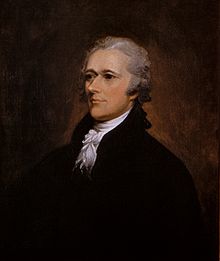Girl Scouts Day; anniversary of the founding in 1912
National Alfred Hitchcock Day
Plant a Flower Day
Katie Fisher Day – pick someone you love and bake them cookies.
National Milky Way Day
 Publication of Federalist Paper #68: The Mode of Electing the President written by Alexander Hamilton in 1788.
Publication of Federalist Paper #68: The Mode of Electing the President written by Alexander Hamilton in 1788.
From www.gradesaver.com
This paper presents one of the more peculiar aspects of the American Constitution: the electoral college. Although in modern American politics, the electoral college is seen by some as an archaic and unnecessary relic of an earlier time, it illustrates the founders’ fundamental concerns about stability.
One of the inherent weaknesses in a government based on the will of the people is the potential for mob rule. This was often the downfall of direct democracies, where all the people decided on public matters directly rather than through representatives. In designing the electoral college, the founders sought to insulate the selection of president from the convulsions of the multitudes. The college was essentially an extra layer of security helping to guarantee that the president would be a truly capable individual.
 Birthday of Jane Pierce (March 12, 1806), wife of Franklin Pierce; first lady 1853-1857. Franklin and Jane Pierce had 3 sons. The first, Franklin, died when 3-days old; the second, Frank, died of typhus at 4-years old. The third, Benjamin, died at age 12 in a train accident on the way to Washington for his father’s inauguration.
Birthday of Jane Pierce (March 12, 1806), wife of Franklin Pierce; first lady 1853-1857. Franklin and Jane Pierce had 3 sons. The first, Franklin, died when 3-days old; the second, Frank, died of typhus at 4-years old. The third, Benjamin, died at age 12 in a train accident on the way to Washington for his father’s inauguration.
Birthday of Jane Delano (March 12, 1862), founder of the American Red Cross Nursing Service.
March 12, 1913 – Canberra was officially named.
According to Wikipedia, the word “Canberra” may be derived from the words used by the indigenus peoples to mean “meeting place”. Or, the translation is “woman’s breasts” and is the Indigenous name for the two mountains, Black Mountain and Mount Ainslie which lie almost opposite each other. In the 1860s, the name was reported to be an anglicization of the indigenous name meaning “hollow between a woman’s breasts”, and referring to the Sullivans Creek floodplain between Mount Ainslie and Black Mountain.
Alternatively,it was noted that Joshua John Moore, the first settler in the region, named the area Canberry in 1823 stating that “there seems no doubt that the original was a native name, but its meaning is unknown.”…In 1920, some of the older residents of the district claimed that the name was derived from the Australian Cranberry which grew abundantly in the area, noting that the local name for the plant was canberry.
1918 – Moscow became the capital of Russia again after Saint Petersburg held this status for 215 years.
1930 – Mahatma Gandhi led a 200-mile march, known as the Salt March, to the sea in defiance of British opposition, to protest the British monopoly on salt.
